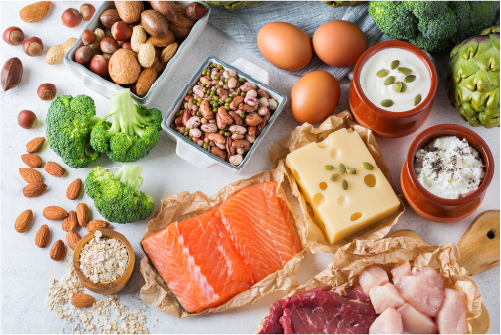The Importance of Protein Intake While on Weight Loss Medication

Semaglutide & tirzepatide are medications used to treat type 2 diabetes and obesity by mimicking the effects of incretin hormones in the body, which help regulate blood sugar levels and appetite. While on semaglutide therapy, maintaining adequate protein intake is crucial for supporting overall health, preserving lean muscle mass, and promoting satiety. Since these medications may reduce appetite and food intake, it's important for individuals to focus on nutrient-dense protein sources to ensure they meet their daily protein requirements. Incorporating lean protein sources such as poultry, fish, tofu, legumes, and low-fat dairy products into meals and snacks can help individuals on weight loss medication therapy achieve their protein goals while keeping calorie intake in check.
Furthermore, individuals on weight loss medication may benefit from spreading their protein intake evenly throughout the day to optimize protein synthesis and support stable blood sugar levels (20 grams per meal). Including protein-rich foods at each meal and snack can help regulate hunger and promote feelings of fullness, which may be particularly beneficial for individuals aiming to manage their weight or improve glycemic control. Additionally, incorporating protein supplements or meal replacement shakes fortified with protein can be convenient options for individuals who struggle to meet their protein needs through whole foods alone. Overall, focusing on high-quality protein sources and distributing protein intake evenly throughout the day can help individuals on weight loss maintain a balanced diet and support their overall health and wellness goals. Aim for 60 grams per day. Here are some protein sources with approximately 20 grams of protein per serving:
Examples of quick, low calorie protein sources include:
- Grilled Chicken Breast: A 3-ounce (85 grams) serving of grilled chicken breast typically provides around 20 grams of protein.
- Canned Tuna: A 3-ounce (85 grams) serving of canned tuna packed in water contains approximately 20 grams of protein.
- Greek Yogurt: A 7-ounce (200 grams) serving of Greek yogurt typically provides about 20 grams of protein.
- Cottage Cheese: A 1-cup (226 grams) serving of cottage cheese usually contains around 20 grams of protein.
- Tofu: A 4-ounce (113 grams) serving of tofu provides roughly 20 grams of protein.
- Lentils: A 1-cup (198 grams) serving of cooked lentils contains approximately 18 grams of protein, close to the 20-gram mark.
- Edamame: A 1-cup (155 grams) serving of cooked edamame (young soybeans) offers approximately 20 grams of protein.
- Quinoa: A 1-cup (185 grams) serving of cooked quinoa provides about 8 grams of protein, but when paired with other protein sources, it can contribute to a total of around 20 grams of protein per meal.
These protein sources can help individuals meet their daily protein requirements and support overall health and wellness. It's essential to incorporate a variety of protein-rich foods into the diet to ensure adequate intake of essential amino acids and other nutrients.
Enjoy!